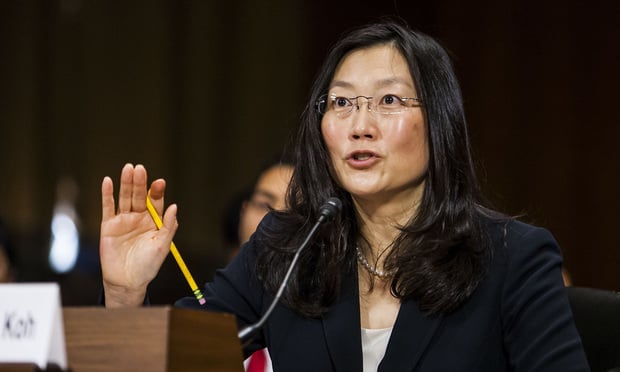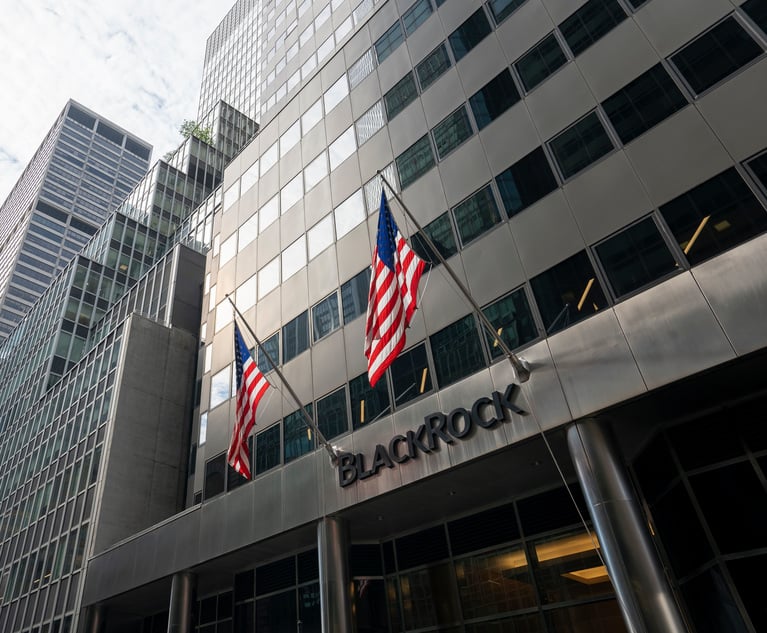$117.5M Yahoo Breach Settlement Was Reasonable, But Legal Work Was 'Not Novel,' Judge Koh Says
In her Tuesday order, U.S. District Judge Lucy Koh signed off on the $117.5 million data breach settlement with Yahoo Inc. but slashed attorney fees by more than $7 million after concluding the deal was "unexceptional" and the legal work "not particularly novel."
July 22, 2020 at 07:09 PM
5 minute read
The original version of this story was published on The Recorder
 Judge Lucy Koh.
Judge Lucy Koh.
U.S. District Judge Lucy Koh signed off on the $117.5 million data breach settlement with Yahoo Inc. on Tuesday, but she slashed attorney fees by more than $7 million after concluding the deal was "unexceptional" and the legal work "not particularly novel."
In her Tuesday order, amended on Wednesday, Koh found the settlement, which resolved the claims of an estimated class of 194 million Yahoo users, was reasonable, despite her assessment that she would have "expected a larger settlement."
Her biggest criticism, however, focused on the plaintiffs' request for $30 million in attorney fees, which she deemed "an unreasonable windfall to class counsel." She also questioned how difficult the Yahoo litigation really was, especially when compared to a $115 million data breach settlement with Anthem Inc., which she called "exceptional" when approving it in 2018.
"Here, the court finds that the result and benefit obtained for the settlement class are fair, reasonable, and adequate, but unexceptional," she wrote. She also found that "many of the legal theories involved in the instant case were not particularly novel," especially given that she addressed them already in Anthem and other cases.
Lead plaintiffs counsel John Yanchunis of Morgan & Morgan in Tampa, Florida, did not return a call for comment. He previously has said about the fees: "We took this case on a contingent basis, and we were not paid at the time any of this work was done. We advanced costs and expenses to the benefit of the class, and I know a comment has been made that this was a no-risk case — I would beg to differ."
The Yahoo order is the latest in which Koh has scrutinized fee requests in class actions, particularly the billing records of the plaintiffs firms leading the cases. In Anthem, she brought in a special master to review the bills, telling plaintiffs attorneys she was "deeply disappointed" that they would bring 49 additional law firms into the case.
The Yahoo settlement includes a fund that provides out-of-pocket costs and two years of credit monitoring or, if class members already have such coverage, alternative compensation of up to $50. It also includes injunctive relief, which Koh praised, in the form of changed business practices.
Yet Koh has criticized the fee request from the start, rejecting the initial $85 million settlement with Yahoo after finding the $35 million in attorney fees "unreasonably high." She also questioned the involvement of 143 attorneys given she appointed only five lawyers to the case.
Last year, she preliminarily approved the revised deal, which increased the settlement fund, but continued to have questions about the number of law firms seeking fees.
At a June 18 final approval hearing, held via Zoom, Koh probed plaintiffs attorneys about specific billing records, demanding that she receive the total number of attorneys, law clerks and others who billed on the case. "I'm not going to award any attorney fees until I get it," she told them.
In Tuesday's order, she chipped away at the plaintiffs' estimated $19 million lodestar, which is the hourly rate billed times the number of hours worked on the case. For the most part, however, she signed off on the hourly rates and, unlike in Anthem, in which she cut more than $9 million in fees, she made little mention about contract attorneys or the number of law firms involved.
Instead, her reduced fee award of $22.7 million, which is 19.4% of the settlement, came mostly from the multiplier, used to reward plaintiffs firms for the risks and difficulties of litigating the case while on contingency. In her order, she targeted the lawyers' acumen, which was "not without errors."
"The instant case involved technical subject matter and a substantial class size, both of which class counsel ably handled," she wrote. "However, class counsel ultimately prepared limited legal filings with numerous overlapping issues, class counsel completed limited discovery relative to the scope of the alleged claims, and class counsel erred with respect to the first motion for preliminary approval."
In this case, she wrote, the amount of the settlement fund was due to the size of the class, once estimated to be as many as 200 million people, and not the skill of the lawyers. In fact, each class member would receive just 60 cents, far less than in other cases.
The case had a low volume of work, she said, and plaintiffs attorneys had stronger facts than in other data breach lawsuits because the case involved multiple cyberattacks dating back to 2013 that Yahoo allegedly covered up and did not report until 2016. That meant plaintiffs attorneys "wielded more leverage to achieve a favorable settlement" than in other data breach cases, she wrote.
"All in all, in light of the number of data breaches, the larger settlement class size, Yahoo's failures to timely disclose, Yahoo's misleading public statements, and the sale of the breached Yahoo data on the dark web, the court would have expected a larger settlement here than in Anthem," Koh wrote. "Instead, the parties largely followed the Anthem settlement. Nonetheless, the court concludes that the $117.5 million amount offered in settlement is a significant sum and weighs in favor of approval."
This content has been archived. It is available through our partners, LexisNexis® and Bloomberg Law.
To view this content, please continue to their sites.
Not a Lexis Subscriber?
Subscribe Now
Not a Bloomberg Law Subscriber?
Subscribe Now
NOT FOR REPRINT
© 2025 ALM Global, LLC, All Rights Reserved. Request academic re-use from www.copyright.com. All other uses, submit a request to [email protected]. For more information visit Asset & Logo Licensing.
You Might Like
View All
Apple Disputes 'Efforts to Manufacture' Imaging Sensor Claims Against iPhone 15 Technology

Special Counsel Jack Smith Prepares Final Report as Trump Opposes Its Release
4 minute read

Who Got the Work: Gibson Dunn and Wilmer to Defend BlackRock in ESG Antitrust Lawsuit
2 minute readLaw Firms Mentioned
Trending Stories
- 1The FTC’s Noncompete Rule Is Likely Dead
- 2COVID-19 Vaccine Suit Against United Airlines Hangs on Right-to-Sue Letter Date
- 3People in the News—Jan. 10, 2025—Lamb McErlane, Saxton & Stump
- 4How I Made Partner: 'Be Open With Partners About Your Strengths,' Says Ha Jin Lee of Sullivan & Cromwell
- 5Essential Labor Shifts: Navigating Noncompetes, Workplace Politics and the AI Revolution
Who Got The Work
Michael G. Bongiorno, Andrew Scott Dulberg and Elizabeth E. Driscoll from Wilmer Cutler Pickering Hale and Dorr have stepped in to represent Symbotic Inc., an A.I.-enabled technology platform that focuses on increasing supply chain efficiency, and other defendants in a pending shareholder derivative lawsuit. The case, filed Oct. 2 in Massachusetts District Court by the Brown Law Firm on behalf of Stephen Austen, accuses certain officers and directors of misleading investors in regard to Symbotic's potential for margin growth by failing to disclose that the company was not equipped to timely deploy its systems or manage expenses through project delays. The case, assigned to U.S. District Judge Nathaniel M. Gorton, is 1:24-cv-12522, Austen v. Cohen et al.
Who Got The Work
Edmund Polubinski and Marie Killmond of Davis Polk & Wardwell have entered appearances for data platform software development company MongoDB and other defendants in a pending shareholder derivative lawsuit. The action, filed Oct. 7 in New York Southern District Court by the Brown Law Firm, accuses the company's directors and/or officers of falsely expressing confidence in the company’s restructuring of its sales incentive plan and downplaying the severity of decreases in its upfront commitments. The case is 1:24-cv-07594, Roy v. Ittycheria et al.
Who Got The Work
Amy O. Bruchs and Kurt F. Ellison of Michael Best & Friedrich have entered appearances for Epic Systems Corp. in a pending employment discrimination lawsuit. The suit was filed Sept. 7 in Wisconsin Western District Court by Levine Eisberner LLC and Siri & Glimstad on behalf of a project manager who claims that he was wrongfully terminated after applying for a religious exemption to the defendant's COVID-19 vaccine mandate. The case, assigned to U.S. Magistrate Judge Anita Marie Boor, is 3:24-cv-00630, Secker, Nathan v. Epic Systems Corporation.
Who Got The Work
David X. Sullivan, Thomas J. Finn and Gregory A. Hall from McCarter & English have entered appearances for Sunrun Installation Services in a pending civil rights lawsuit. The complaint was filed Sept. 4 in Connecticut District Court by attorney Robert M. Berke on behalf of former employee George Edward Steins, who was arrested and charged with employing an unregistered home improvement salesperson. The complaint alleges that had Sunrun informed the Connecticut Department of Consumer Protection that the plaintiff's employment had ended in 2017 and that he no longer held Sunrun's home improvement contractor license, he would not have been hit with charges, which were dismissed in May 2024. The case, assigned to U.S. District Judge Jeffrey A. Meyer, is 3:24-cv-01423, Steins v. Sunrun, Inc. et al.
Who Got The Work
Greenberg Traurig shareholder Joshua L. Raskin has entered an appearance for boohoo.com UK Ltd. in a pending patent infringement lawsuit. The suit, filed Sept. 3 in Texas Eastern District Court by Rozier Hardt McDonough on behalf of Alto Dynamics, asserts five patents related to an online shopping platform. The case, assigned to U.S. District Judge Rodney Gilstrap, is 2:24-cv-00719, Alto Dynamics, LLC v. boohoo.com UK Limited.
Featured Firms
Law Offices of Gary Martin Hays & Associates, P.C.
(470) 294-1674
Law Offices of Mark E. Salomone
(857) 444-6468
Smith & Hassler
(713) 739-1250








